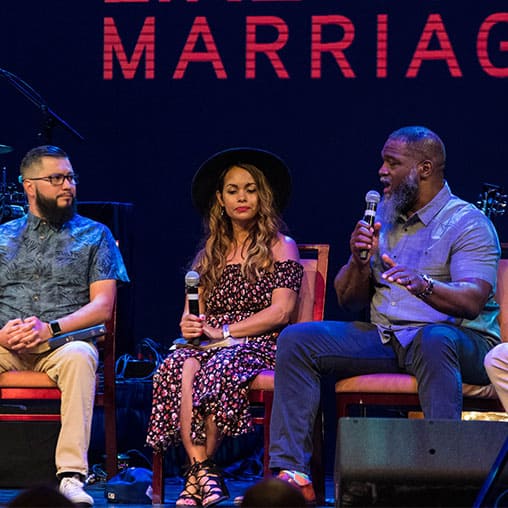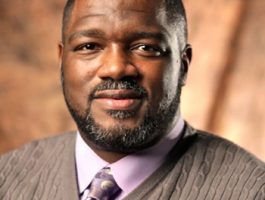
Frustrations with Intimacy
A panel of experts answers some of your toughest questions about marriage, especially pertaining to marital intimacy. Voddie Baucham, Juli Slattery, DA and Elicia Horton, and Ron Deal address difficult situations with truth from Scripture.
Show Notes
About the Host
About the Guest
-
A panel of experts answers some of your toughest questions about marriage, especially pertaining to marital intimacy. Voddie Baucham, Juli Slattery, DA and Elicia Horton, and Ron Deal address difficult situations with truth from Scripture.
-
Dave and Ann Wilson
Dave and Ann Wilson are hosts of FamilyLife Today®, FamilyLife’s nationally-syndicated radio program. Dave and Ann have been married for more than 38 years and have spent the last 33 teaching and mentoring couples and parents across the country. They have been featured speakers at FamilyLife’s Weekend to Remember® marriage getaway since 1993 and have also hosted their own marriage conferences across the country. Cofounders of Kensington Church—a national, multicampus church that hosts more than 14,000 visitors every weekend—the Wilsons are the creative force behind DVD teaching series Rock Your Marriage and The Survival Guide To Parenting, as well as authors of the recently released book Vertical Marriage (Zondervan, 2019). Dave is a graduate of the International School of Theology, where he received a Master of Divinity degree. A Ball State University Hall of Fame quarterback, Dave served the Detroit Lions as chaplain for 33 years. Ann attended the University of Kentucky. She has been active alongside Dave in ministry as a speaker, writer, small-group leader, and mentor to countless wives of professional athletes. The Wilsons live in the Detroit area. They have three grown sons, CJ, Austin, and Cody, three daughters-in-law, and a growing number of grandchildren.
-

D.A. and Elicia Horton
D. A. and Elicia Horton have been fighting for their marriage for over 15 years. D. A. is working on his PhD in Applied Theology at Southeastern Baptist Theological Seminary, and Elicia has master’s degrees in Religious Studies and Organizational Development from Calvary Theological Seminary. They teach and serve together at Reach Fellowship, a church plant in North Long Beach, CA, and have been blessed to counsel couples jointly for over 10 years.
Juli Slattery
Dr. Juli Slattery is a widely known clinical psychologist, author, speaker and broadcast media professional. She's the president and co-founder of Authentic Intimacy. She hosts a podcast called Java With Juli, where she answers tough questions about relationships, marriage, spiritual, emotional and sexual intimacy. She has authored eight books, including 25 Questions You're Afraid to As...more
Ron Deal
Ron L. Deal is one of the most widely read and viewed experts on blended families in the country. He is Director of FamilyLife Blended® for FamilyLife®, founder of Smart Stepfamilies™, and the author and Consulting Editor of the Smart Stepfamily Series of books including the bestselling Building Love Together in Blended Families: The 5 Love Languages® and Becoming Stepfamily Smart (with Dr. Gary Chapman), The Smart Stepfamily: 7 Steps to a Healthy Family, and ...more
Voddie Baucham
Voddie Baucham wears many hats. He is a husband, father, former pastor, author, professor, conference speaker, and church planter. He currently serves as Dean of Theology at African Christian University in Lusaka, Zambia. Dr. Baucham holds degrees from Houston Baptist University (BA in Christianity/BA in Sociology), Southwestern Baptist Theological Seminary (M.Div.), Southeastern Baptist Theological Seminary (D.Min.), an honorary degree from Southern California Seminary (D.D.), and additional...more
A panel of experts answers some of your toughest questions about marital intimacy. Voddie Baucham, Juli Slattery, DA and Elicia Horton, and Ron Deal address difficult situations with truth from Scripture.
Frustrations with Intimacy
Bob: This is FamilyLife Today for Wednesday, March 13th. Our hosts are Dave and Ann Wilson; I’m Bob Lepine. The area of sexual intimacy in marriage is an area that is fraught with risk and vulnerability. How do we learn to communicate with one another and to draw closer to one another in this area? We’re going to spend time hearing about that today. Stay with us.
And welcome to FamilyLife Today. Thanks for joining us on the Wednesday edition. I don’t know if I told you guys this; but we did something a little different, a few weeks ago, on the Love Like You Mean It® marriage cruise. We had one night where, instead of having a speaker, we brought several of our speakers onto the platform; and we did Q&A with them. We had invited our cruise guests to submit the questions to us, ahead of time, and say: “What do you want us to ask this panel of experts? What do you want them to address, related to marriage?”
Do you know what the number-one subject was?—what the questions came in for; right?
Dave: I have no idea, Bob.
Bob: Oh, come on!
Ann: Was it sex?
Bob: It was, indeed.
Ann: Wow!
Dave: Look at that! My wife knew.
Ann: I know.
Dave: That’s why I married that woman, right there. [Laughter]
Bob: It was, indeed, the subject of intimacy.
Dave: Wow!
Bob: I think couples are looking for a place to be able to have a sanctified, safe conversation about the most intimate part of our marriage relationship; because a lot of couples today are finding that they are frustrated, or it’s just not working the way they hoped it would.
Dave: And there are a lot of lies out there about: “What does God think?”
Ann: And we need people that will be real—
Bob: Right.
Ann: —and honest, with a biblical perspective; because people are wondering, “What does God have to say about this?”
Bob: When you’ve got married couples together—we have the whole ship to ourselves, and we’ve got hundreds of couples—this year, we had 1,500 couples; next year, on the 2020 Love Like You Mean It marriage cruise, we’re going to have 2,700 couples joining us. It’s the largest cruise ship there is—the Allure of the Seas. We’re going to be going to Saint Thomas in the Virgin Islands; we’re going to be going to Puerto Rico.
It’s our tenth-anniversary year, and we’re excited about this opportunity. It’s already
70 percent sold-out from people, who have gone before; but we wanted FamilyLife Today listeners to have an opportunity to sign up; so we’re letting you know about it, here on FamilyLife Today. If you sign up between now and March 25th—and you use the promo code, “CRUISE MADNESS,”—you can save $400 per couple off your stateroom. You can go to FamilyLifeToday.com for information about how to sign up for the cruise. It really is a great week away together, and you’re going to learn a lot about marriage—not just sexual intimacy—but we talk about issue related to conflict and all kinds of issues.
It was interesting to see the questions that came in for the panel on this year’s cruise. And as I said, we started with intimacy; because that’s where most of the couples were asking questions. We had on the panel: Ron Deal, who gives leadership to FamilyLife Blended™; Dr. Juli Slattery, who has written books about marital intimacy; D.A. and Elicia Horton—D.A. is a pastor from Long Beach, California; they wrote a book called Enter the Ring, which is about the marriage relationship—and then, Voddie Baucham joined us.
I thought, “Let’s just address the number-one question with these experts, and let’s talk about marital intimacy”; so that is right where we went at the beginning of this discussion on the cruise.
[Recorded Cruise Panel]
Bob: So, let me start off with the issue a lot of people ask about: “What do we do with the unequal interest aspect of intimacy?” Interestingly, over the years, we’ve had that stereotyped that it’s the guy who is always interested and the woman who is not. More and more, what we are seeing at FamilyLife®—we’re hearing from a lot of women, who are saying, “I’m interested; my husband is no longer interested.” That’s been an increasing issue. So, whether it’s—whether it’s one/whoever it is—one person has a desire; the other person doesn’t. What are your thoughts on that?
Juli: First of all, it’s normal to be incompatible when it comes to sexuality. I think, sometimes, young people will say, “Well, how do you know if you are going to be compatible when you get married if you don’t have sex first?” I’m like, “Let me just ruin it for you—you won’t be.”
Bob: Yes.
Juli: But here is what I want people to know—is that I think the incompatibility and the difference in desire is actually part of God’s plan. It’s not a mistake; it’s not a problem—it actually is what makes lovemaking force us to be unselfish.
Bob: That sounds like a trick that God played on us.
Juli: Yes; it is.
Bob: But you’re saying it’s for our good.
Juli: Yes.
Bob: Ron, you want to chime in on this?
Ron: Yes; I love that thought.
I think: “In humility, count others more significant than yourselves, [Philippians 2:3]” applies outside the bedroom just like it does inside the bedroom—it’s the heart of: “What serves my spouse?” That is how you begin to bridge gaps in desire, as well as: “What do you want to have for dinner?”—all kinds of things.
There are different kinds of desire too. I think this enters into the picture. Sometimes, the way you define desire is problematic; so, typically, we think of desire as whoever initiates sex—but there is actually another kind of desire—and that is, if you are receptive to the idea of it. The other person may say, “I’m hungry for Chinese.” You go: “You know, I hadn’t really thought about it; but now that you have brought it up, yes; I think I could go there. Let’s do that. Let’s have Chinese.” That’s, equally, desire—see; but when you are keeping score and saying, “Who started sex?” that equals the high-desire partner—it’s unnecessary.
Oftentimes, since men have more testosterone, we think about sex more naturally. Because of that, we’re the initiators more often—65/70 percent of the time—but that doesn’t mean she doesn’t have desire. It just means she’s receptive to your initiative of desire. In that sense, you both have desire. It’s only when we keep score that we begin to create problems for one another.
Bob: So, I’m going to put our married couple on the spot here and just ask you guys—and I know these guys well enough to know that I can put them on the spot and ask personal questions—so has this issue of different desire been something you guys have had to deal with?
D.A.: Yes; it has. It wasn’t just, early on, in the marriage. We’re about to celebrate 16 years of marriage. [Applause] Amen; praise God!
But another thing—just within the nuances of our story—you know, it took us five years into marriage before my wife fully became known and vulnerable by telling me she’s a sexual abuse survivor.
Bob: Wow.
D.A.: This whole time that she was rejecting my advances—it just really destroyed me inside. It got to a point, where I had to say: “Are you cheating on me? Is somebody else pleasuring you? Who is it? What’s going on?” or “Dang! I’m not that attractive,”—so every single insecurity started surfacing—but she was living in fear the entire time of allowing me to be the first person, on this side of eternity—outside of her attackers—to know what had taken place.
I think that tension, for those five years, God kept giving us opportunities—one, her for freedom; and then for me to protect you, and then for me to see how I can serve her in this area of vulnerability. So, anything you want to—
Bob: Can I just say something to you?—that is, I am sorry—I’m sorry for what you experienced, and it shouldn’t have happened to anybody.
How have you processed—I mean, you’re 16 years into marriage; you guys have had talks and all of this—is this still something that you have to wrestle with?
Elicia: Yes; I feel like for me, being a survivor of that—how to see how God was going to make that a part of my story. Even though it’s a part of who I am and my story, it doesn’t define who I am.
For me, it was about learning how to allow my husband to process with me, because I would just shut him out—you know, any reflection of the past of how I was abused—I would automatically shut down. It was allowing him to come into this process of hurt for me and allow—and actually, for him to pastor through, which was a blessing for me to have; because I didn’t know how to talk about it.
For me, I feel like, even as we’re talking about transparency—and I love what our brother said—it’s how to remember where we have to communicate these things to each other. It is about being vulnerable; it is about being transparent. Sometimes, for us—because we’re millennials and we love that—we start there. We build from that, but it takes us communicating that.
And had I not ever opened up and communicated that to him, my poor husband probably would have felt rejected every single time. It took courage from both of us to be able to be willing to talk about it but, also, be willing to work through it together. I praise God for that.
Bob: Voddie, what do you want to add to this?
Voddie: Yes; I think it’s also important that we understand seasons and circumstances—that there will be different seasons in our relationships, where our sexual intimacy will look very differently. There will be circumstances in our relationship that will cause our sexual intimacy to look very differently.
When you put all this together—and this whole idea of us communicating and being transparent with one another—that’s how we navigate the seasons and the circumstances so that it’s not just: “This is not happening. Something must be wrong. There is less frequency than I would desire…” / “…less frequency than my spouse would desire; but here is the season that we’re in. We need to make these adjustments,” / “Here are the circumstances that we’re in. We need to make this adjustment,”—so, I think, understanding that.
Then, the second thing I will add is—just say, “No,” to the lies and the myths. This whole idea of a wedding, and fairytale, and happily ever after—we have a view of an appropriate sexual relationship in marriage that is rooted, nowhere, in reality for most of us. What we’re frustrated with has nothing to do with dysfunction, necessarily, in ourselves sometimes. It has to do with completely erroneous expectations that have been fed to us by a culture that is lying to us about sexuality.
Bob: It leads to—people had questions about this—so: “What if the season is an extended season for one person and not for another? Is it okay for a married couple to say, ‘We’re just going to kind of be okay with being sexless in our marriage’?”
Voddie: First Corinthians, Chapter 7, [verse 5]: “…only by agreement and for a season…” That season ought to be discussed—determined/clear—and there ought to be a purpose behind it. That’s something that we ought to prioritize.
Part of the way that we need to change our thinking on that is to recognize that—it is not only a part of that one-flesh union—but it is also a living, breathing picture of the expectation and anticipation that we have of our union with Christ. This is a gospel issue—sex in your marriage is a gospel issue; it is a picture-of-Christ issue; it is a desire-for-the-Lord issue—so we can’t ignore it; we can’t just let it go. It’s not something that we can just put on the back burner without being intentional.
Bob: One of the questions that we got from people, who are here, relates to expectations about roles in our marriage. A lot of frustration expressed from wives about husbands, who are passive and won’t take leadership—particularly in the areas of spiritual leadership—and frustrations from men, who are talking about wives who can be controlling or nagging. Okay; so, if you would say, “Yes, that’s true in our marriage,” how do you start to address those issues?
I’ll go to brother Voddie for an answer on that, because I think that’s something you’d like to speak to. [Laughter]
Voddie: Yes; yes. I think I should write a book about that—
Bob: —or two or three, maybe.
Voddie: —or two or three. [Laughter]
I think this is another area where we need to be biblical in our understanding of our roles. One of the biggest problems—again, I don’t want to sound like a broken record; but the culture is selling us lies. It’s selling us lies about what it means to be a man and what it means to be a woman. It’s causing a great deal of confusion. When the culture says that biblical masculinity, as we understand it, is toxic, and wrong, and bad, that’s problem number one; then, problem number two is—we don’t replace it with anything; right?
I think we need to go back to the Scriptures and understand that God made us different. There is a complementarity between us—we are equal in value, but we bring different gifts to the table—we have different roles and responsibilities. I think if we start—if we start there, then, at least, the conversation has an authority other than, “I feel.”
Bob: “What I want…”—yes; right; right—so you’ve got to start with that as a foundation.
If you’re sitting down, Juli, with a wife, who says: “I’m not attracted to my husband, because he just sits around/doesn’t do anything. He’s passive. He doesn’t take any spiritual leadership—no engagement. I mean, how can I be attracted to a guy like that?” What’s your advice to her?
Juli: Well, you are talking about toxic masculinity—kind of where our culture is saying that. There is also a lot of confusion for women.
And one of the things that I’ve learned, as a wife and, also, as a clinical psychologist, working with couples—that we don’t talk about is—I think women have a lot of power. We probably have more power in marriage than men do. I would say that, perhaps, is by God’s design. When we look at Proverbs 14, it says, “A wise woman builds her house, but with her own hands, the foolish one tears hers down,”—that’s power.
As a young wife, I really felt the Lord asking me, “What are you going to do with your power?” I think there are a lot of things that women do with their power, without realizing it, that tear their house down.
Bob: What kind of power are you talking about that wives have?
Juli: Well, let’s talk about a male ego. Men are very sensitive.
Voddie: Do we have to?
Juli: We do, [Laughter] and you can chime in here. God created men with this vulnerability and their sense of competence. Who has the greatest vote, on planet earth, of whether or not you are a hero or a zero?—it’s your wife—that’s power.
When my husband walks through the door—even the way I frame things to my kids—do I set him up to be a hero and to reflect that he is my hero? Faults/weaknesses—we’ve been through a lot—but he’s the guy that God has given me. Calling out that hero—that’s power. It doesn’t always look like yelling, and being loud, and demanding, but it also doesn’t look like being a doormat—it’s asking God, “Give me the wisdom to use that power well.”
Bob: D.A., if you are sitting down with a man, who says, “My wife is controlling and nagging, and I just—I’m so fed up with this,” what’s your advice to him?
D.A.: Well, there are a couple things. Number one, I never want to go into the assumption that both partners are regenerate believers in Jesus Christ. So, the first thing that I want to see is: “Where are you in your relationship with God, as it relates directly to Jesus Christ?” If we can help them understand: “My relationship is non-existing. How can I become a follower of Christ?”—you set the foundation of the marriage on the bedrock of the gospel, that every other nuance can now be brought safely into the gospel.
But I think, also, it’s a discipleship issue for those who are actually regenerate, Holy Spirit-filled believers of Jesus Christ. I’ll be the first to admit—my wife and I did not grow up in environments, where there was discipleship as a normal rhythm; so she was very frustrated. She’s the wife that’s sitting down, saying, “I’m not attracted to my husband, because he doesn’t pray; he doesn’t lead; he doesn’t read; he doesn’t do any of these things.”
I’m like, “I didn’t grow up in an environment, where I saw my dad do that.” As much as I say, “I don’t want to be like my dad,” I am like my dad in some ways; but then there is also this rhythm of: “Okay; now, if Elicia is coming at me trying to be controlling, well, I’m just passive by nature,”—so that’s my natural response. That’s where I have to lean on the ministry of the Holy Spirit to say, “I need a supernatural response to shepherd my wife’s heart in this moment and create a complementary environment in our home.”
That’s where I recognize—I tell people: “She is way gifted than me in various areas of our marriage,” and “I empower her; and I love her; and I esteem her; and I affirm her when it comes to the areas where she’s strong; but at the same time, she recognizes her weaknesses; and she’s leaning on me to be strong. That’s where we develop—not independence or co-dependence—but inter-dependency and when the Holy Spirit is at work in both of us.”
That’s where I would challenge that man to consider: “Who is your wife walking in discipleship with if she is a follower in Christ? Who are older women or younger women—or peers—pouring into her?—walking her through biblical truth that she can process and engage with?”—but then, at the same time—“Who are the men in your life that are challenging you and calling you to a higher standard?” Then we can stumble through the nuances of what it looks like to love your wife/to lead her; but at the same time, empower and affirm for her to walk in the area of giftedness and strength that she is wired by God to walk in.
[Studio]
Bob: Well, that was D.A. Horton who was on a panel, along with Juli Slattery and Ron Deal, Voddie Baucham, and D.A.’s wife Elicia. This was on board the Love Like You Mean It marriage cruise a few weeks ago. That question about roles in marriage was, I think, prompted by a lot of wives, who wonder, “Is it legitimate for me to expect that my husband is going to lead us, spiritually, in our marriage relationship?”
Ann: I think a lot of women—we wonder what that even means. It is a biblical concept; but I don’t think we’re sure what that entails, what it means, and what our part is; so I love that they went there.
Bob: Yes; a lot of wives have a phantom picture of what that is supposed to mean. They think it’s going to mean—
Ann: I had that phantom.
Bob: Did you? [Laughter]
Ann: Oh sure.
Dave: I was going to jump in—my wife had that picture—and I’ve got to say, “You guys went into—
Ann: Yes; you were real in this.
Dave: —“on that panel.” What a great panel for people—in the area of sex and other areas—but then, you know, when Ann and I got married, we struggled quite a bit. Actually, she did, more than me, with me; because I was not meeting the expectations she thought a spiritual leader—spiritual man/husband—would look like.
Ann: Well, I think that’s why it is good to talk about it; because we have expectations of what we think it should be. Then, when those expectations aren’t met, we’re disappointed; so I love how they talked about that.
Bob: Well, and here is what happens—you have a panel like this one night, on board the Love Like You Mean It marriage cruise; and that evening or the next day, you’ve got an extended period of time, as a couple, to say, “What did you think about what they said last night?” or “You know what I’ve been thinking about?”—just to process.
Most of the time, in our schedule/in our lives, we might hear something like this; and we go, “That was good,”—and then, we’re on to the next thing—but when you’re seven days on the Love Like You Mean It marriage cruise, you’re just thinking, and talking, and processing, and really working out some stuff in your marriage relationship. That’s why couples say to us, all the time: “We come off the cruise more connected/more in love. We have built into our marriage.” It’s not just, “We had a great time in the Caribbean,”—it’s, “We built into our marriage.”
Ann: Well, and sometimes, people can’t afford to go on the cruise—
Bob: Right.
Ann: —but it doesn’t mean we shouldn’t have those conversations of going deeper. Even listening to this today, you might write down a few questions and ask, “Hmm, I could ask this to my spouse on a date night or even tonight—
Bob: Right.
Ann: —“and ask his thoughts on this—what do he think about this?”
Dave: I think you could do it on the bathtub and pretend you’re on a boat. [Laughter] It’s like, “We’re on the Love Like You Mean It bathtub cruise,”—you know? [Laughter]
Bob: You can send your spouse a link to today’s program and listen to it—maybe, not at the same time; but both of you listen to it—and then say: “What jumped out to you?” or “What question would you ask if you had a chance to ask the panel a question?” In fact, we are going to hear more, this week, from this panel—other questions that came in.
Again, I want to remind listeners—the 2020 Love Like You Mean It marriage cruise—the one we’re doing next February, Valentine’s Week, February 9th through the 16th—it’s
70 percent sold-out as of today. Over the next couple of weeks, we expect it to, maybe, fill all the way up. Right now, we’ve got a special offer for FamilyLife Today listeners, where you can attend the 2020 Love Like You Mean It marriage cruise and save $400 per couple off your stateroom; but that offer is available between now and March 25th. You have to use the promo code, which is “CRUISE MADNESS,” to take advantage of that. Go to our website, FamilyLifeToday.com, if you want more information about the 2020 cruise; or if you’d like to register, call 1-800-FL-TODAY.
Dennis and Barbara Rainey will be back with us on the cruise next year. Dave and Ann Wilson will be joining us. Dr. Gary Chapman is going to join us. Ron Deal will be on board. I will be on board, along with my wife Mary Ann. We hope you’ll join us for the 2020 Love Like You Mean It marriage cruise on board the Allure of the Seas—one of the largest cruise ships in the world. Again, more information, online, at FamilyLifeToday.com—plan to join us, in 2020, for the Love Like You Mean It marriage cruise.
Now, tomorrow, we’re going to hear from our panel again as they answer questions about: “What you do if your marriage is in the doldrums?—if you just don’t have anything in common anymore?—you don’t like spending time together anymore?” We’re also going to hear about how you rebuild trust when there has been a betrayal in a marriage relationship. I hope you can tune in for that tomorrow.
I want to thank our engineer today, Keith Lynch, along with our entire broadcast production team. On behalf of our hosts, Dave and Ann Wilson, I’m Bob Lepine. We will see you next time for another edition of FamilyLife Today.
FamilyLife Today is a production of FamilyLife of Little Rock, Arkansas; a Cru® Ministry. Help for today. Hope for tomorrow.
We are so happy to provide these transcripts to you. However, there is a cost to produce them for our website. If you’ve benefited from the broadcast transcripts, would you consider donating today to help defray the costs?
Copyright © 2019 FamilyLife. All rights reserved.
1



